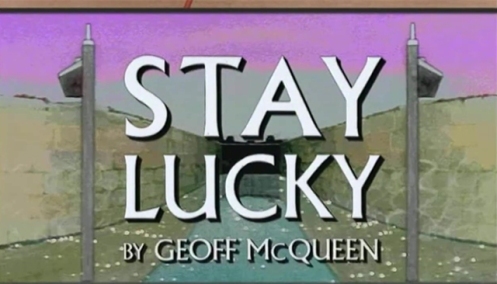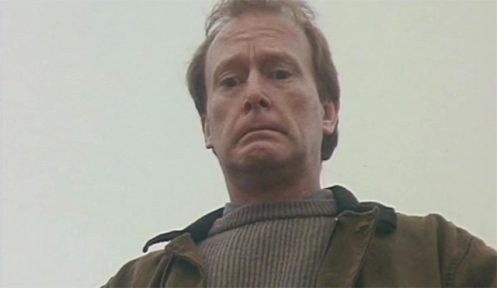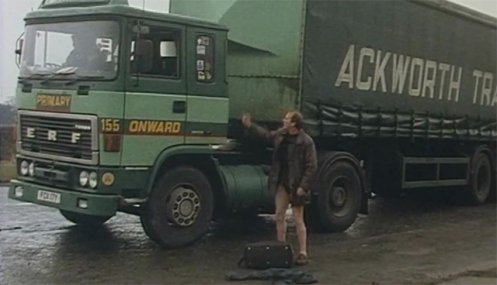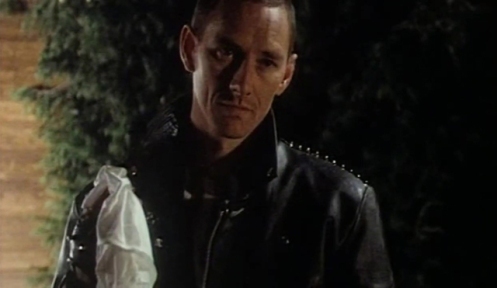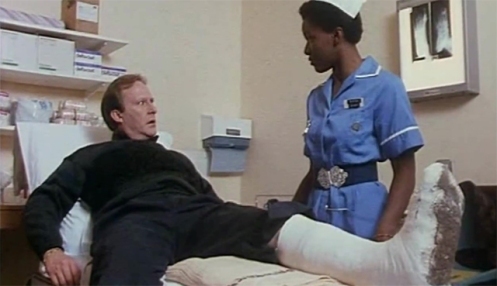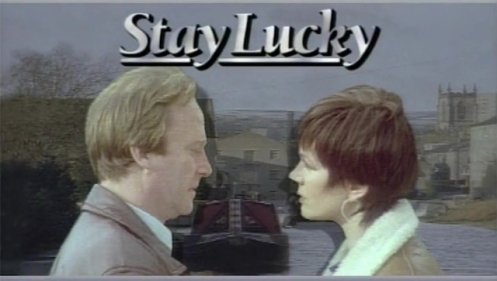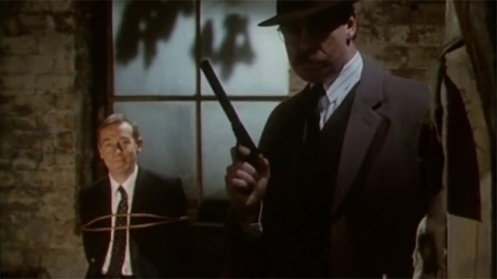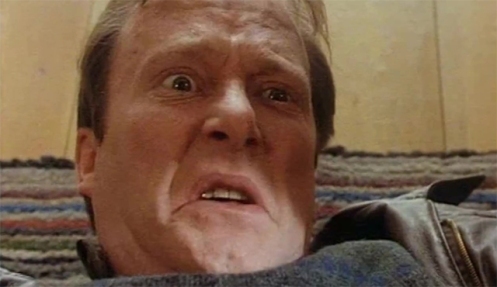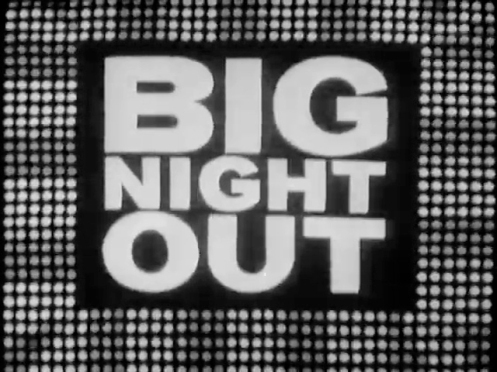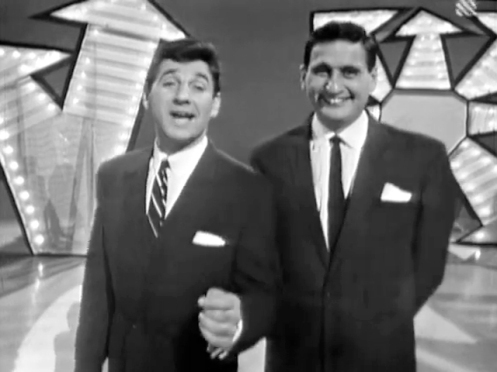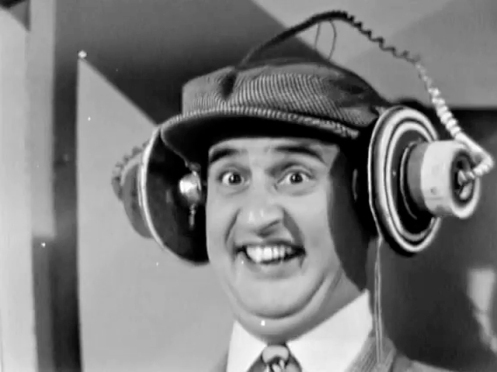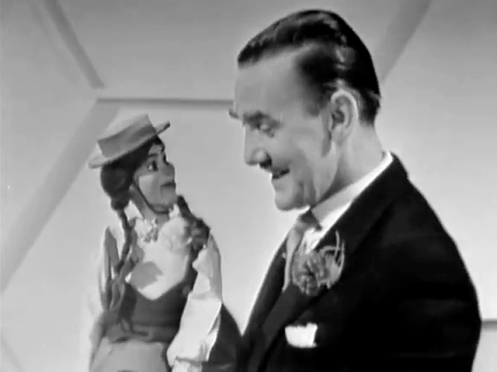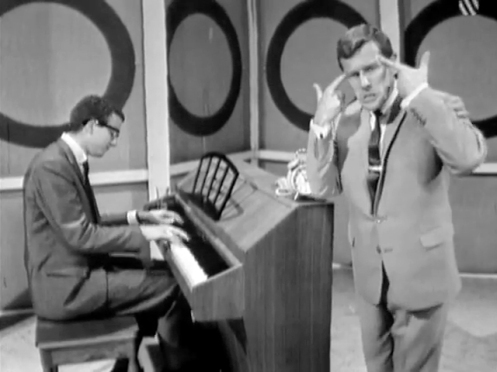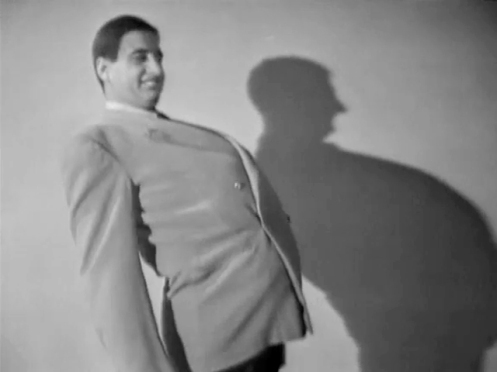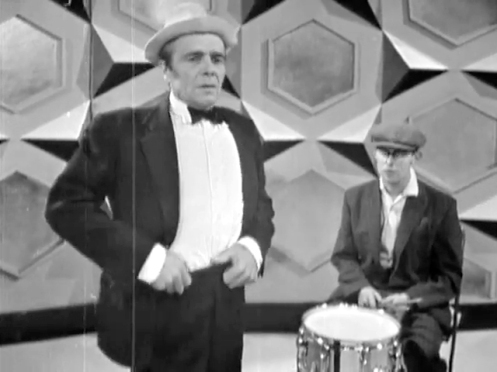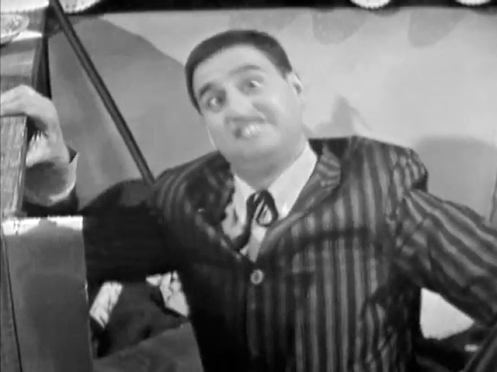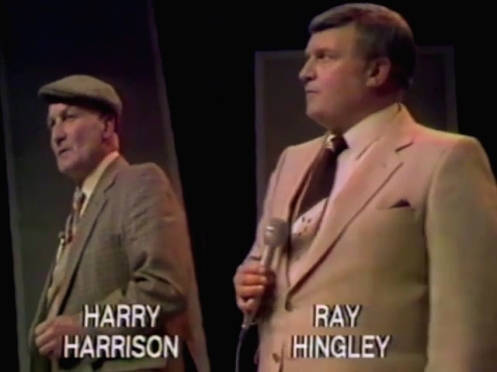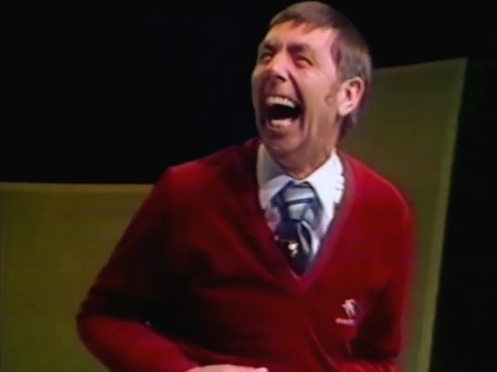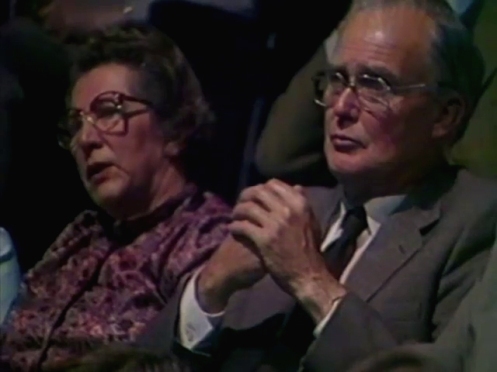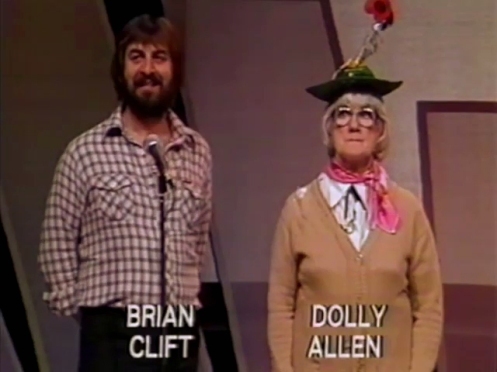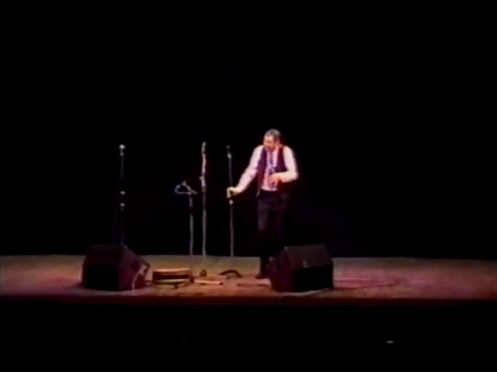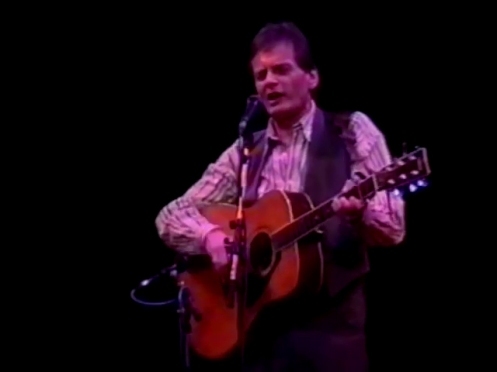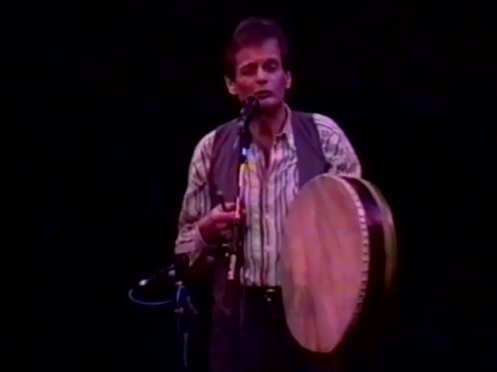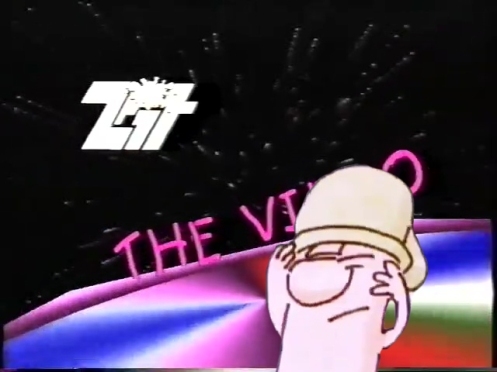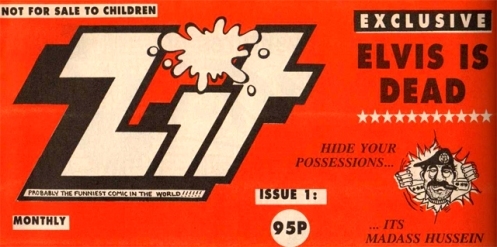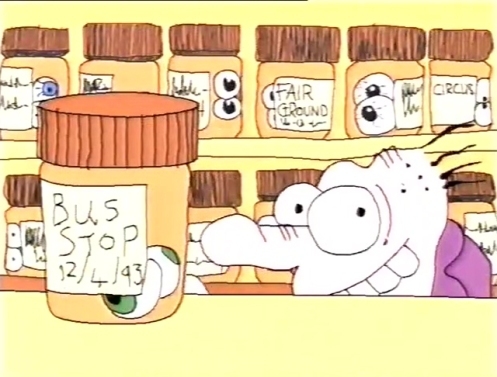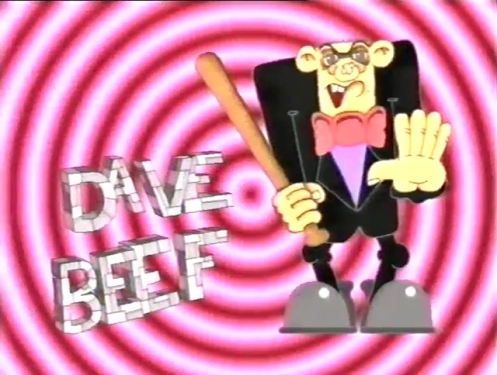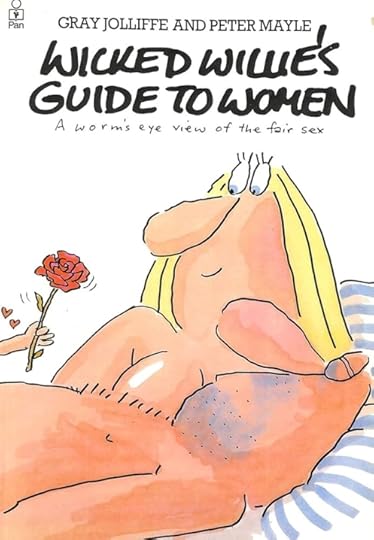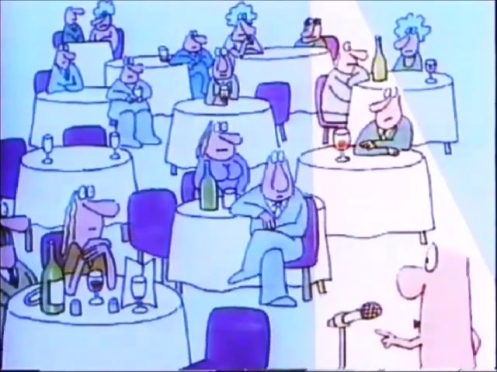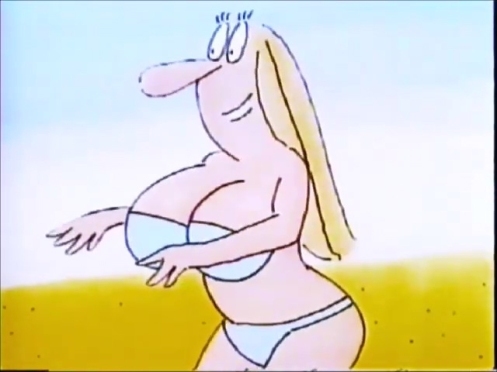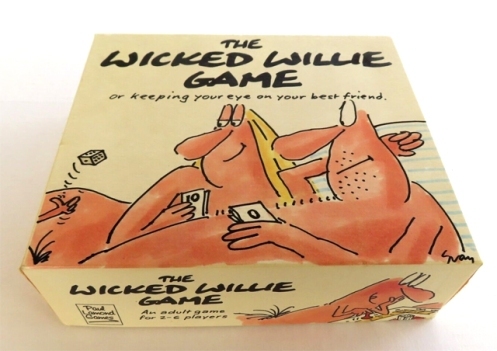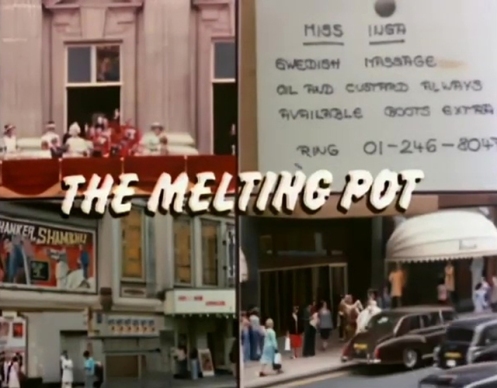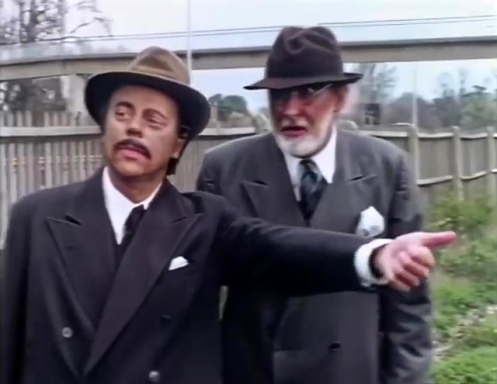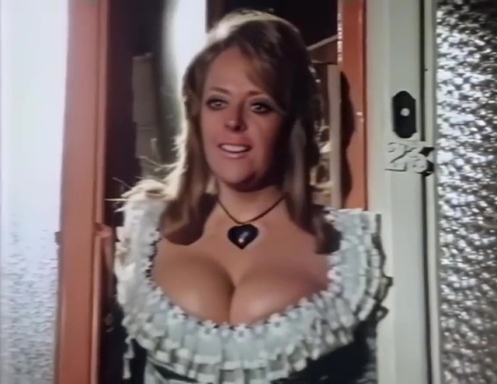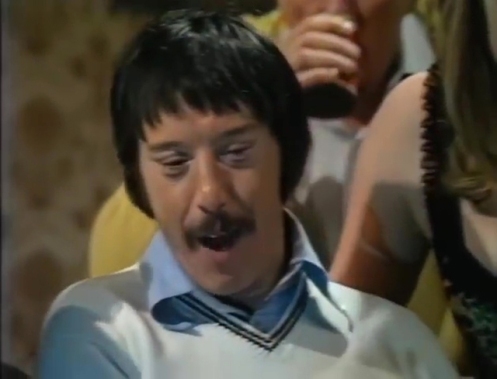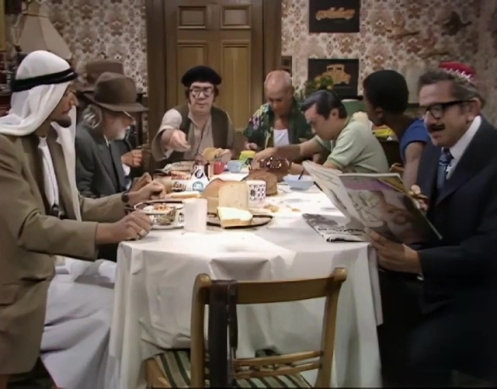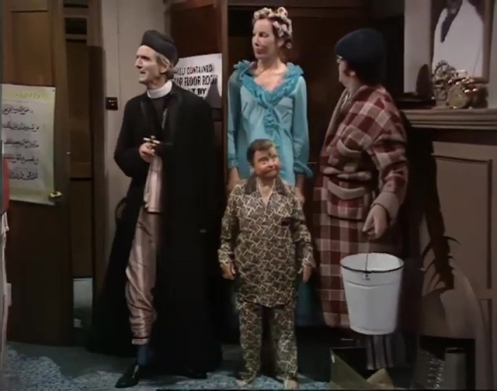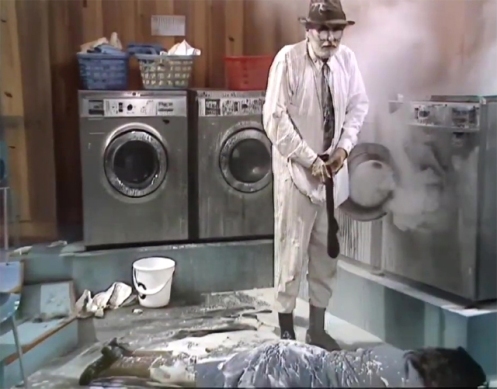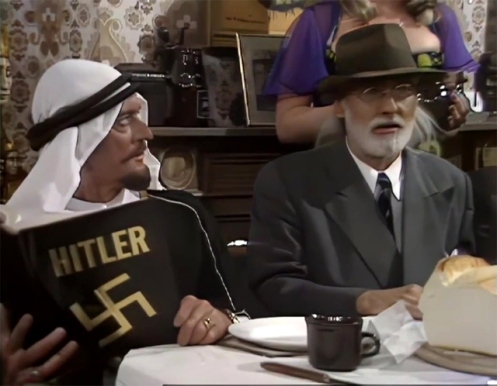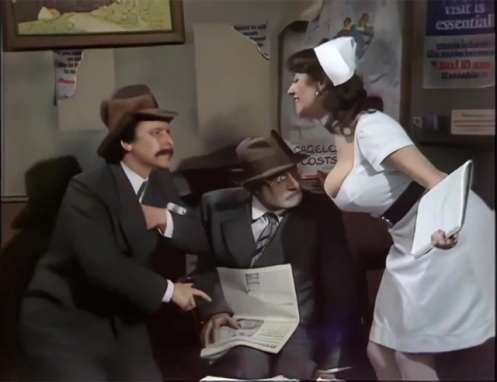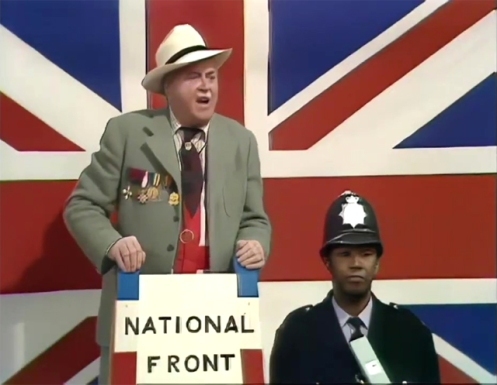Stuart Millard's Blog
August 19, 2025
Stay Lucky
Dennis Waterman is an iconic figure; a lean slab of ham topped with rusty hair, wrapped in a brown leather jacket, and secure enough in his masculinity to let loose both wolves which dwell inside every man; punching wrong’uns and grabbing the mic for a bloody good sing-song. Nostalgic trawls through his body of work place him as real throwback, not of performance but of casting. A bloke like Waterman would never get those roles now, like the way you stick on Die Hard in 2025, well aware a man with a body like that (a body, by any standards, in good shape) wouldn’t even get an audition for John McClaine today. Get some veins on it! Learn to love the needle! Similarly, in the world of modern television, even a prime Waterman would never land the hunk or hardman roles that were his bread and butter.
Not particularly charismatic, he’s so lacking in identifiable traits, you’d be hard pushed to do an impression. Yet Waterman persisted, one of Britain’s most recognisable faces, with the Sweeney to Minder pipeline cementing him as a tough nut through decades of consistent work, until the day he was brown bread. In a long career, there’s many things one could focus on, such as the fantastically weird title for his first album, Downwind of Angels. “Cor, Gabriel, you let one go, son?” Instead, we shall look upon something suggested by one of my beloved Patrons, namely Yorkshire Television’s Stay Lucky, which ran for 27 hour-long episodes between 1989 and 1993.
I get sent a lot of links, but the opening five minutes had me pinned to the screen. In those 300 seconds, Waterman topples out of frame clinging to a drainpipe while escaping an angry husband; the husband of a much younger Chinese woman picked up at a night club while Hot Stuff blares in the background. Hubby’s a Triad, causing Waterman to flee London, slo-mo leaping onto a moving boat in the Thames, into the opening credits, where a 1989 CGI skeleton roly-polys across the titles under Waterman singing the feem toon — “I’m out on the road, and the going is tough, they’re after me and I need a friend, but who can you trust?”
We’re at episode one, titled A1 Rain Dancer, and immediately aware this represents a very specific genre from a very specific point in time. Old style telly, before the Golden Age, no past traumas will be unpicked here; no promo shots with characters stood in a line in jackets looking grim. There will be zero moody montages under needle drops of Spotify bangers, no long dialogue scenes or monologues; instead being raced from scene to scene like Den’s got us by the scruff of the neck. Absolutely filled with stuff, none of which is of any consequence, it’s the simplistic storytelling of yore, in a world where each criminal underling is bumbling and harmless, each mob boss a scenery chewing panto villain, and where Dennis Waterman is every woman’s dream and every man’s nightmare. More succinctly, it’s the kind of stuff my mum would binge through on ITVX in a couple of sittings.
Though half the episodes were written by creator Geoff McQueen, who also created The Bill and wrote for both of Jim Davidson’s sitcoms, Stephen Moffat’s name crops up once, and the series 3 premiere’s directed by Lawrence Gordon Clark, who created A Ghost Story at Christmas. There’s similar pedigree in its enormous cast list, featuring every stalwart face you’d expect in 90’s television, from Julie T. Wallace to Tom Wilkinson, and dozens of ‘it’s them off that thing’ types — Belinda Lang making two appearances as Lady Winderscale; Roy Evans off EastEnders as simply ‘morris dancer’. Absolutely standard TV fare of the time. And by ‘standard’ I mean ‘weird as shit’.
On the lam, Waterman’s hitching a ride to ‘the north’ and getting splashed by lorries, pleading to the Gods “someone give us a bleedin’ lift!” Inside a posh jaguar speeding past, Jan Francis off Just Good Friends retorts (though neither can hear each other) “sorry, dickhead, not today.” Thankfully, a very accommodating rugged Scottish trucker called Angus lets him dry his wet trousers on the heater and gives him a Mars Bar. “I’m famished,” says Angus, “d’ya fancy something hot inside yer?” With the promise of a service cafe up ahead, he nods down at Waterman’s crotch. “Gis a wee look, I’ll spring for the grub. Come on, gis a look, that’s all I wan’, just a look.” Feel bad for him actually, so starved of intimacy on the road, he’s begging for a glimpse of Dennis Waterman’s phallus. Must resemble a piglet’s trotter in a clump of wire wool.
Cut to him hurriedly getting out — “on your bike, bleedin’ shirtlifter!” — at an A1 service station where Jan Francis has broken down. Trousers in hand, he tries to charm her by tap-dancing in a puddle (hence the episode title), before uttering those eight little words which immediately put all women at ease, “I’m not a lunatic or a perv, honest.” One thing audiences of the late-80s loved was the bickering ‘posh totty/bit of rough’ dynamic, and that’s Stay Lucky‘s primary selling point, two characters who clearly despise each other, needling back and forth with insults and folded arms, yet fated to end up doing sin in a bed. He fixes her car in exchange for a lift to Leeds, and they bid final angry farewell; “Right stroppy bird. Last time I saw a mouth like yours, it had a hook in it!” I’m sure that will be the last time they see each other.
But he’ll discover she actually dropped him 40 miles shy of Leeds, instead where she lives in a houseboat, which has just been ransacked. He gets a proper lift to Leeds in the Reliant Robin of an Italian juggler with a Super Mario accent and loose toupee, who he meets in a cafe, firmly establishing this as the comedy-drama genre, not funny enough to be a sitcom, and too far-fetched to slot alongside similar-timeslot fare like Cracker, Taggart, or Morse, whose horny gay trucker characters would be revealed as serial killers, glove compartments absolutely chocker with severed nobs. Speaking of baddies, our subplot sees a man called Studs rifling through Francis’s underwear drawer, taking a big whiff of her knickers and rubbing them all over his face. Tight-fitting punk jeans, leather jacket, buzzed haircut, earring, and fingerless leather gloves; like the finest wines, this tough guy look has only gotten camper with each passing year.
As we’ll (eventually) learn in drip-drip exposition, Studs is working for a man called Ken, who’s seeking a little black book owned by Francis’s dead husband, whose heart gave out mid-sex with a mistress — Ken’s wife! The widow and the scarlet woman bump into each other graveside, Francis given the book, which contains the mysterious key to a painting, which only “Old Cecil at the junk shop” knows more about. Cecil’s not in, but he’s got a Benny from Crossroads style assistant in a woolly hat, continuing the time honoured tradition of slow-witted characters referring to people by the first letter of their surname — “Hallo, Mrs. H!” Not-Benny sends her off to a boozer in Harrowgate after Cecil, coincidentally exactly where Dennis Waterman’s headed to! As she walks away, the Benny makes a lustful face, implying he too is in love with her, or at least “she make my worm go all funny, so she does; makes him stand bolt upright in me britches thy knows!”
Also clearly in love with her is a mate with a little ponytail played by Eric Catchpole off Lovejoy, but we’ll get to that. Built on improbable coincidences, she’s almost kidnapped by Studs outside the pub, but Waterman’s there to spot her escape as she runs over his foot. Feeling bad, she gives him a lift to the hospital. Now on crutches and in a cast, he’s allowed to stay on the houseboat sofa, where the “dickhead” count rises to four. Most improbably is that thing everyone does in films, laying straight under a blanket for a kip and not doing a piss before bed. Mate, always reset the bladder before sleep.
The next day, he finds out the foot’s only bruised and not broken, and the nurse put a cast on cos she was “just playing safe.” No wonder the NHS is losing so much money. Cue Waterman so jittery in front of a lady at the chemists, she thinks he wants rubber johnnies for his heavily-freckled willy, but he’s after bandages and a plaster of Paris to make a fake cast around a Wellington boot, so the posh bird won’t turf him out. Roger the Dodger ass scheme. This weird veering between drama and 1970’s sitcom continues as Waterman and Catchpole get into a fight where the weapon of choice is wet fish — “I’ll batter you!” — and Waterman’s fish is comically small, implying Angus would’ve have had to switched the overhead light on to see anything. Waterman calls him a wilf, like he’s hosting Runaround, and a gink, before Jane Francis walks in, with a fifth “dickhead.”
Francis gets in her car to find Studs waiting in the back like Michael Myers, and Ken wants the black book, or else he’ll “let this animal do what he wants.” The way he’s dressed, that means get some poppers up his hooter to be Serving in the front row at G.A.Y. where three of S Club 7 are doing a midnight appearance. He shakes the book out of her handbag, returning the knickers while cackling like the Green Goblin, but the mystery of the black book is not resolved, so we have no way of knowing what happens (besides watching episode two, but I shan’t be doing that.)
Of course, Waterman and Lady Muck’s last goodbye turns into the long-simmering kiss, and as she goes off to bed, he warns, quite matter-of-factly, “I think you’d better lock your door,” I guess joking that he might do a rape? When he hears it actually lock, he lets out a disappointed “oh, shit” as we cut to credits. He’s not the only one let down, as the skeleton from the opening never makes an appearance, unless it’s meant to be Dennis’, and if so, technically it’s in every scene, but a rather arbitrary choice. Why not have CG recreations of his appendix or vas deferens rolling around instead? It’s gone by series two, one of which I have also sampled, selected by having the coolest title, The Devil Wept in Leeds, which with a late October airdate, suggests a spooky Halloween episode.
It’s not, and this is the Moffat episode. I’m not familiar with his most famous work, Sherlock and Who, I just know he’s got a lovely perm, and should’ve been locked up in writer’s jail for how blatantly Chalk was just Fawlty Towers in a school. Biggest shock is the change in feem toon, indicating a shift in Big Red’s circumstances, no longer a man on his own with a price on his head, and duetting with a female singer (not Jan Francis, despite the fact they’re together now). They sing boat-based puns, “I’ll be the captain — no you’ll be the mate,” and advise us, “the feeling’s getting stronger, stay lucky and free!” with Waterman’s gravelly voice painting a vivid mental picture of him stood in the recording booth in his jeans.
We open on a very calm Michael Jayston with half a dozen guns on him in a warehouse, feet literally in a concrete block, and Dennis Lill dressed like a 1920’s gangster from Chicago warning “dying is easy, Valentine, it’s the waiting that kills you,” then Lill’s goons are distracted by boxes of of novelty alarm clocks going off. Elsewhere, Waterman and Francis are bickering as he drives to pick up some… novelty alarm clocks, and walk in to have guns pointed at them. Where episode one had the captain from Red Dwarf as an American heavy, among today’s henchmen, we’ve the landlord of the Queen Vic who got murdered by Nick Cotton. Dialogue between Lill and Jayston is the height of 1990 comedy bants.
“What would you say if I told you I don’t know?”
“I’d say I don’t believe you.”
“I don’t know.”
“I don’t believe you.”
“Yep, you were right!”
Through contrivances, the pair help Valentine escape, taking out bumbling goons who either shoot each other by mistake, or get flattened when the concrete-footed Valentine falls through a wooden staircase. Dickhead count during this sequence: one. Turns out, Valentine’s the deadliest hitman in Europe, and insisting on paying them for their troubles, decides the best thank you would be to whack the “tub of lard” local councillor who keeps denying them planning permission. What follows is a farce of trying to stop him, which has Valentine, then Waterman, and finally Lill all enter the councillor’s office pretending to be window cleaners. There’s a horrible scene Emma Wray off Watching interrupts their boat-sex, where Waterman won’t leave the bedroom to talk to her because — its implied — he’s waiting for his solid penis to deflate, plus some hijinx with a remote controlled sniper rifle, before everything converges at a charity show, where the councillor will be making an appearance.
Incidentally, the houseboat which smells of sex with Dennis Waterman has an unintentional Tardis quality, about three times as wide as it appears from the outside. Its interior wears the same colour pallet as the rest of the 1990 world, horrid brown, everyone and everything looking absolutely awful; Jan Francis in jumpers and a massive Jon Motson football coat, and unruly haircuts which all look like wigs. Maybe the brownness was a deliberate choice to disguise all the dog mucks everywhere before they brought fines in.
With Valentine watching through a sniper scope in the lighting box, the big show’s compared by Bobby Knutt, and we can pick out but two words from his routine over the squabbling of our leads — “Japanese whaling.” But that’s preferable to Francis’s line about a “clever tongue,” Waterman’s response to which forces the audience to picture him engaged in cunnilingus, no doubt saying things like “I’m giving your Jack and Danny a right bleedin’ nosh down here!” I figured the councillor would be handing out a big cheque, but no, he’s doing a magic routine, “from the Magic East!” If he gets the linking rings out, I’ll whack him myself. As Waterman rushes the stage to block Valentine’s shot with bits of scenery, notable is a cut to the laughing audience, where the featured background artist’s face is a young Dave Chapman from Dick and Dom in Da Bungalow/Andor.
Waterman’s thrown out by security, while Francis simply calls the cops on ‘The Devil’ Valentine, who’s arrested. And that’s the end of that chapter! Simpler times, when the only thing we had to worry about was if the posh lady and earthy fella who argued all the time might not interconnect genitals. It seems the entire ‘diametrically opposed man and woman get into scrapes’ set-up is a dead genre nowadays, and with Waterman also in the ground, sadly we’ll never get that gruff-romantic-fixer dramedy crossover with a team-up between Thomas Gynn (that’s his name in this, I forgot to say), Boon, and Lovejoy.
…
This piece first appeared on my Patreon, where subscribers could read it a month before it landed here. If you’d like to support me for as little as £1 a month, then click here to help provide the world with regular deep dives about weird-bad pop culture, early access to my videos, my podcast, and all kinds of other stuff.
There’s a ton of content, including exclusives that’ll never appear here on the free blog, such as 1970’s British variety-set horror novella, Jangle, and my latest novel, Men of the Loch. Please give my existing books a look too, or if you’re so inclined, sling me a Ko-fi or some PayPal cash.
July 1, 2025
Big Night Out
“Seen Millard’s new post? He’s finally tackling Big Night Out.”
“Ooh, Vic and Bob?”
“No, not that Big Night.”
“I think you’d better sit down.”
One of the legendary showbiz heckles was said to have livened up a performance by Mike Winters, at the moment Bernie poked his head round the curtain, inciting a withering cat-call of “Oh Christ, there’s two of ’em!” As regulars here will know, one Winters brother is more than enough, and in my unending sift through of random old telly, Bernie has become my nemesis; the analogue ghost in the VHS machine. With decade-spanning unexpected appearances in anything and everything, there’s truly no safe space from Bernie randomly showing up like a fucking bailiff to go “ehhhhh!” ATV’s Big Night Out aired on Saturday nights between 1960 and 1965, so pre-dates the ‘I’ve got a big dog!’ era, with Bernie still speaking to, and more importantly, performing with, big brother Mike, as co-hosts for an hour-long variety show.
There’s something quite freeing about not having to prepare for the jump scare of Bernie suddenly lurching from the wings, as he’ll be in plain sight, on camera and doing his… thing for multiple hours, over the course of five episodes from the third series. I believe this is the oldest thing I’ve covered, and much of it’s out of my cultural wheelhouse, leaving me mostly flying blind. Episode one aired on June 29th of 1963, six years before the Manson murders. If he’d have watched it, cheeky Charlie would’ve escaped from prison especially to do them early. Though not included in the shows I’m watching, later in the run, the Beatles would mime some songs and partake in skits, and a contemporary comment under said performance by an American remarks of Bernie: “Wow, the guy on the left reminds me of Steve Carell!” God, some sick bastard’s going to AI him into The Office one day aren’t they?
We open with the pair comically bickering, Mike breaking a prop bottle over Bernie’s head and smashing a chair over him, as is every boy (called Millard)’s dream. Bernie’s in a stripy spiv suit, and though it’s in black and white, you can just tell it’s a horrible colour. Shame it’s not a black screen. Less than a minute in, we get a “you gorn potty or summink?” from Bernie, the gormless gutter presentation of which made me laugh so much when he did it in my 3-2-1 video, I physically could not stop rewatching it. You can all thank ITV’s voracious thirst for copyright that “you gorn potty or summink?!” hasn’t appeared in every video since.
As a double act, it’s not quite the expected joker/straight man, where Bernie’s interrupting like Bobby or Eddie, but more like Mike’s been lumbered with his oafish brother in an Of Mice and Men scenario, parents forcing him to take Bernie along to the studio, cos the last time he was left alone he let the bath overflow and it fell through the ceiling. Mike’s got both the look and mannerisms of someone who’s playing a showbiz agent in a film, while Bernie’s in his prime, a handsome, energetic young performer. Only joking. One thing you can say about him is he realises he’s been born with a funny mug, and is never not pulling a stupid face, biting into his top lip to showcase the buck teeth, like a bloke with a big cock who keeps taking it out. One of the real cultural ‘what if?’ questions is to imagine a world where Bernie Winters wasn’t born with big gnashers, so never made it onto television. Like Dexter Fletcher, a freeze frame of any moment will land on a grotesque gurn.
Thankfully it’s not All Winters, All The Time, but like every ‘variety’ show, the bill is eighty percent singers; Craig Douglas and Dickie Valentine and Matt Monro; the latter doing I Get a Kick Out Of You, a classic big band number which very casually has a verse about cocaine being boring. Ronnie Hilton puts on a Jamaican accent to sing a calypso about future Indoor League presenter Freddie Trueman. I’m having a real old man “all modern singers look the same!!” crisis with the parade of neat chaps in suits and bow ties crooning away, each approaching the camera with the overfamiliar confidence of someone about to talk me into setting up a direct debit. None of them dance, but they all click their fingers. Maybe it’s a joke and it’s just one singer introduced with a new name for each song. Adding to the sense we’re merely watching a parody sketch set in the 1960s, this is an era before the old standards got written; almost every song here about break ups that you can Google the lyrics for and come up empty handed. Though I do recognise Gulf Aid‘s Gerry Marsden, him and the Pacemakers so boyish and clean cut, his guitar’s virtually up by his chin, not like those low-slung punk rockers lurking around the next decade.
The female singers are easier to discern. Petula Clarke, Susan Maughan (with hair like those apps that turn your photo into a silly 1950s yearbook picture), the Peters Sisters from America. I was shaking with excitement when I went to their Wiki page in the hopes one would be called Andi, but alas. Still, that beats the Kaye Sisters, who despite appearances here, turn out not to even be bloody related, like the Undertaker and Kane. Gulf Aid’s Vera Lynn pops in, and it’s absolutely mental to see her doing something other than We’ll Meet Again, especially as this is decades closer to WW2 than, well, every performance since. Evidently, each passing year shoved her further into the box of Force’s Sweetheart. Three numbers she gets, none of which even remotely allude to Hitler’s hi-jinks. I’m this close to throwing rotten fruit at the screen for such flagrant disrespect to our troops.
As we all know, there are two genres of variety; singer and ventriloquist, and Big Night Out‘s got plenty of the latter too. Saveen’s your classic top hatted toff with a common as muck alcoholic dummy, whose disproportionately small legs hang down Polio-limp. But it’s Daisy May who made his name. A pigtailed girl, she’s much smaller than your regular puppet, requiring Saveen to put his face right next to hers, both their voices down to whispers, in a routine where a middle-aged man seduces a baby-sized child puppet. She asks him for a kiss, but he refuses. “I do want to, but not now, I can’t kiss you in front of all these ladies and gentlemen.” A third puppet, pulled from a bird cage, appears to be made from an actual taxidermied parrot, and what a fate, to have your corpse reanimated to make jokes for the Brothers Winters. What must the parrot’s ghost think if he’s watching from the afterlife? Please, nobody manipulate my dead body when I’m gone, not if Stephen Mulhern’s hosting.
Another vent, Dennis Spicer puppets a moth-eaten, one-eared chimp which looks like it came from a jumble sale, before an honestly very funny routine using two audience members to ‘sing’ in silly voices. But I wish we’d seen the act he’d perform a year later at the Royal Variety, with a dummy which came to life played by Kenny Baker. Two weeks after that, Spicer was killed crashing his sports car, with the actual Queen sending a tribute to the funeral. His dummy, in the back seat during the accident, was (suspiciously) completely unscathed. Perhaps there’s a Big Night Out curse, as comic Don Arrol — a surname which can only be said in an Albert Steptoe voice — would be dead four years after his spot here. Even though he’s being ironic, he does a bit of string magic, and a final song celebrating livin’ life, which has a line about “places to go,” where the pianist plays a, shall we say, Eastern riff, and Arrol makes his eyes go all slitty.
But sandwiching all these guest acts is the comedy, song ‘n’ dance of Mike and Bernie. For a Who Wants to Be a Millionaire?, their dance routine’s like what kids at a birthday party make the parents watch after five minutes choreography in the garden. If it’s true you can tell what someone’s like at sex by the way they dance, I think Bernie Winters somehow accidentally puts it up his own arse. The sketches are even worse, Bernie’s gurning amped up to max, teeth out for the lay jehmen. A Noddy (Bernie) and Big Ears (Mike) is so lazy, Big Ears doesn’t even have big ears, with a beard made from individual cotton balls glued to his cheeks. “Have you got a fairy godfather?” “No, but I’ve got an uncle I’m not sure of!”
A weekly sports reporter sketch casts Bernie as various figures; a female tennis star, a race driver who’s not wearing any trousers; Cassius Clay. For that, Bernie’s doing the voice but not blacked up, and delivers an actual good joke about Clay’s tricky new left hook. Why is it so tricky? “Cos I deliver it with my right hand!” When he’s a ballet dancer, praise be for low-res standard definition, as we don’t have to see what he’s packing. I don’t think I could live with myself if Bernie Winters was really slinging some meat. He ends up doing the Twist — “You heard of Chubby Checker? I’m his brother, Double Decker.” That’s not how surnames work! It’s all exactly what you’d expect from sketches by these two, but does provide one unexpected moment, when Bernie loses everything on a game show, pulling a gun from his pocket and shooting himself right in the head. Violence on television is having a terrible influence on our kids! (in 1963) Distressingly; and fittingly, as he’s always going on about birds; one sketch shows Bernie (in a Scrooge sleep-hat) sleeping in a bed with two women. Bernie Winters is in a throuple, and I can’t even get a text back. I’m kidding, I never text anyone.
Bernie’s performance style is that of a child given one line in a school play and deciding he’ll steal the show, and there’s a sense, like Jimmy Fallon on SNL, that when he starts laughing, it’s a deliberate act to draw the attention onto himself. Thankfully, we get the breather of a commercial break where a woman with impeccable posture and one of those 1960’s bras so pointy, her boobs resemble that He-Man toy with a drill for a head, sells us a hoover. Another ad has the PG Tips chimps out for a drive, one of ’em dressed like a copper, and presumably all their teeth pulled out, just in case. If they’d have done that with Bernie, he’d have been in trouble. Incidentally, for someone whose catchphrase is threatening to smash people’s faces in, how’d we think he’d have fared in the UFC? First port of call for anyone with a time machine, surely. One episode starts with Bernie’s silhouette for a Hitchcock gag, and he must be the only man whose teeth are visible on a shadow.
Thankfully, those seeking laffs don’t have to settle on the stylings of the Winters, with various guest comics too. Freddie Frinton does his ‘dishevelled old drunk’ routine, top hat, broken cigarette wobbling; basically the sort of thing Steve McFadden does in Easties. On a global scale, Frinton’s best known for the Dinner for One sketch, shot later this very year, which to this day is traditional New Year’s Eve viewing in much of central Europe. In my house it’s Ghostbusters II. Comedian Al Reed starts off by complaining how bad things have gotten. Buddy, you have no idea, up in your cultural sanctuary, a good twenty years from the emergence of Bobby Davro. This old fashioned observational comedy watched from the future always has real ‘cut to:’ energy. “With your motor car, I mean, where can you park ’em?” Yeah mate, I bet there’s nowhere to park in 1963. Do a bit about how expensive gas and electric are next. But a good thing about looking back is the Eye-Spy game of witnessing a real use of a bit which long-since fell into cliché or parody, and there’s a rush of excitement when Reed produces a very genuine “take my wife; please!” He’ll be recommending the veal next! Though it’s far from a classic, when Bernie’s in a school uniform sucking on a lollipop, we get a “Charlie Chan’s a different man since he backed into an electric fan” which would later come out of Brian Connelly’s mouth on The Keith Harris Show.
As stock monuments of comedy go, there’s few greater than Max Wall. This isn’t Freddie Starr as Max Wall, or Eddie Large or Wolf from Gladiators, but the proper Max. After the last seven years of Patreon, all and sundry marching about in a too-small dinner jacket and wig, it’s like seeing King Arthur in person. But this is not the Max Wall everyone does; the Max who so frightened me as a boy; a prancing elfin Child Catcher. That jet black Hulk Hogan hair has been cropped short and hidden beneath a hat, like when KISS took off their make-up, and the legs are standing still, not flailing. What a swizz! Imagine buying tickets to see Gervais and he doesn’t do any transphobic stuff.
Like I said, I’m out of my wheelhouse here, and it seems like this is Wall’s post-modern period, deconstructing his act as the band come in too early on A Nightingale Sang in Berkeley Square. “That was funny, wasn’t it?” he remarks. “The orchestra all loud and quick. Everything went wrong!” Near the end, he announces “I am now going to do the walking up and down bit,” and then, the arse juts and out come the crazy legs. He’s got a hat on, but we can see the white of his socks. “There it is again, look!” Sure, Metallica are in their LOAD era, all eyeliner and grade fours, but they just played the shit out of Battery.
Personal favourite act are The Three Monarchs, a trio of mouth-organ wielding fellas in dinner jackets, one a big doofus with an extremely 1999 goatee on the point of his chin, like he plays bass for Papa Roach. There’s a use of the word ‘pussy’ before it meant fannies, a nice bit of business with a moving spotlight, which gets smaller as it’s swept away with a broom, and some good lines. “I was born with a beard, my mum was tickled to death.” I note one gag down as a future comeback to any youths making loud speaker-phone calls on the bus: “Talk, talk, talk, that’s all you do. I think you must’ve been vaccinated with a gramophone needle.” I’ll enjoy the last words I hear being “what the fuck is a gramophone?” as I lay there getting my head kicked in. Also, in this time period, spaghetti bolognese is such a new and exciting dish, it plays as one of those ‘misunderstood word’ jokes. “Do you like it?” “Only when it’s played by Mantovani.” That said, well into the millennium, spaghetti bolognese, along with pizza and pasta, was still categorised by my grandad as ‘foreign muck’.
In another highlight, you know I love a dance troupe named after their choreographer, well, try and top The Lionel Blair Dancers, with young Lionel right alongside kicking and jiving with four ladies, while looking disconcertingly like the sinister doctor from Chris Morris’s Jam. Everything takes place on a minimalist stage with a really retro feel — oh right, it’s the real past, back when they’d stick one prop lamp post on a empty studio floor and pretend it was a street, and dancing girls jazzed up their routines by holding a sparkler. Annoyingly, a Richard III sketch steals the “Winters of my discontent” line I was going to use to sum up the dreadful nature of what’s unfolding, with a massive theme of the series being ‘cor, women just nag on all the bleedin’ time, don’t they?!’ say, Bernie in a hospital bed, Mike as his doctor. “How’s that pain in the neck?” “She’s gone to live with my mother!” Unfortunately, sitting through this lot hasn’t exorcised my Bernie Winters demons one blasted bit, even though I’ve now seen he’s capable of slightly more than just feeding his dog then waiting for applause. If anything, it’s given me a greater understanding of why Mike pissed off to America so he wouldn’t have to see him ever again. Lucky swine.
…
This piece first appeared on my Patreon, where subscribers could read it a month before it landed here. If you’d like to support me for as little as £1 a month, then click here to help provide the world with regular deep dives about weird-bad pop culture, early access to my videos, my podcast, and all kinds of other stuff.
There’s a ton of content, including exclusives that’ll never appear here on the free blog, such as 1970’s British variety-set horror novella, Jangle, and my latest novel, Men of the Loch. Please give my existing books a look too, or if you’re so inclined, sling me a Ko-fi or some PayPal cash.
May 18, 2025
A Black Country Night Out
Britain is so weird. I don’t mean Page 3 or the inexplicable rise of Paddy McGuinness, but specifically that it’s a tiny country with no two places you couldn’t drive between in a day, yet inside its imaginary borders, a vast variation of accents, language, and culture. Look at that response-farming meme which crops up on the socials every other week, asking ‘where you’re from, what do you call this?’ under a picture of a bread roll. Or bap. Or cob. Or Davro buttock. Scousers, Brummies, Mancs, Scots, Essex Girls/Lads. Dozens of little enclaves, where everyone’s exactly the same as the people from the other ones, yet also different, in the way they say their vowels or describe the small doughy product you’d shove a burger in. Or what they laugh at.
I always felt removed from regional tribalism. What is a Sussex accent? I speak it, but it’s nothing you’d ever hear as an impression. We don’t even have any good regional slang. There’s a place called Dogshit Alley, does that count? Perhaps we’re too far south to cultivate much of a specific identity, as local pride gets more intense the further north you go (note: London is the North), with constant talk about ‘Northern hospitality’ that you’d never hear from an inhospitable Southerner. Most fascinating to me in these self-contained pockets of culture is the comedy. As a kid, my entire knowledge of Wales came from the covers of mum’s Max Boyce LPs, him clad in a rugby shirt and brandishing an enormous leek. In my mid-teens, I went on a coach holiday to Scotland, with long highland drives soundtracked by the albums of Irish comic Hal Roach, driver laughing along to jokes he’d been listening to weekly for years. “Write it down,” Hal would advise after every gag, “it’s a good one!”
Hal never rang the doorbell on Noel’s House Party, but had a successful career of packed houses all the same, holding the world record for longest running engagement at a single venue, with 26 years at a Dublin hotel. This brings us to A Black Country Night Out, a mere sample of a live show which ran for over twenty years. Beginning in 1971 as a charity night in the Robin Hood pub, its roster of local comics, folk singers and spoon players even toured Spain and Vancouver, releasing a number of live albums, and eventually, this VHS. Though ‘Black Country’ is the kind of thing Farage cries out while tossing and turning in a nightmare, it refers to an area of the West Midlands, taking in places like Dudley and wherever the Peaky Blinders are walking round in slow-motion.
The pub comedy equivalent of Boyhood, opening titles inform us this was filmed at the Swan Theatre Midlands on 8th April 1982 and the Grand Theatre Wolverhampton 8th March 1992. There’s a strong sense it was sold out of car boots by men who cum real ale, and the British equivalent of those American Blue Collar Comedy tours — “you might be a redneck if…” But quickly it will become clear that, as someone who can see France if the weather’s right, I’m an outsider here. I don’t even speak the language. We open on the night’s performers lined up for a folk song; “If you’re friendly and true, you’re welcome to stay, to sup and to drink any time of the day.” I’m not particularly friendly, so you may have to have me removed. Judging by the next line, they’d have no trouble dragging me out – “strong in the arm and strong in the head, Black Country born and Black Country bred.” Settle down, tough guy! The song segues into an introduction for each act – “from Jon and young Tom, a message we giveth…” It’s like the bloody Wu-Tang Clan! Given the ages of the participants, every one of them is now dead.
The show is “a mixture of Black Country songs and humour,” and a perfect example of things solely powered by regional pride. There’s nobody like us Black Country folk; we’ve got our own rules, our own language! First act Tommy Mundon’s introduction is a lesson in itself. “He’s a railien(?), or he’s a boster, meaning he’s a good ‘un.” I can’t speak to his goodness, but Mundon’s certainly a weird ‘un. Long-limbed with a small head, he’s like Slenderman cosplaying as Mr. Rogers. “Halesowen police are looking for a tall handsome man for raping women. If the money’s good, I might apply for the job myself!” This is an uncharacteristically tart opener, as Mundon’s otherwise toothless and family friendly, in classic The Comedians definition of a stand-up, reeling off jokes everyone knows. His philosophy of “the little gags that don’t tax the brain always go down the best” is proven by doing the old Two Ronnies ‘stolen toilets/the police have nothing to go on’.
He’s an energetic stage presence, leaping up and down, arms windmilling, gob agape like the Mouth of Sauron and literally buckled at every punchline. He does earn it, with my old favourite about the man who’s regular as clockwork, half-six every morning — “trouble is, I don’t get up until nine!” Our next act has a unique talent of “conjuring very beautiful words from the complex dialect of the Black Country.” It is of course the Bard of the Black Country, Harry Harrison. Anyone taking a pound every time they say Black Country will be out-earning Musk within the hour.
Harrison’s your note-perfect 1982 man in his sixties. Flat cap, beige Sunday best, trousers hitched so high, if you opened his flies you’d be greeted by his navel. I can understand maybe half of what he says, accent turning it into a Rowley Birkin sketch. Something about putting a dog’s tail in a mangle? Harrison’s one of those whose entire personality is ‘I am from a place’, and cranks up the regionalness to max volume. Shopping’s for nancy-boy Southerners; proper Black Country folk go “shapping” in those new-fangled supermarkets. Evidently, even in 1982, this is such a new experience in the BC, it requires a poem about shin-pads for the “dodgem games” with trolleys and L plates on the baskets. “These supermarkets, them like motorways, with a need for speed on shapping days.” The audience are silent throughout.
Next is a man originally from Wales (a filthy outsider!), folk singer Jon Raven. Great opener, asking the men in attendence if they ever considered getting rid of their wives, cos in the good old days, you could just tie a brick round her neck and chuck her in the canal, or put her up for auction. His song Wife for Sale invites us to imagine “you’re in Bilston, and the year, 1827.” I’ll try my best! These are sing-a-longs, though his cue of “it’s ding-a-dong ding-a-dong ooh arr ooh arr — all together!” precedes a gander at the miserable looking audience, reserved and mumbling, decidedly not doing it all together. One absolutely superb cut shows a very serious older gentleman joining in with all the vigour of a Richard Dawkins ‘amen’ when his family say grace at Christmas dinner.
“At two o’clock certain, the sale begin, so yow as want splicin’, be there with your tin!” You fuckin’ wot, mate? The next act is so unique, her (not his like you were thinking, Andrew Tate) introduction asks “how often do you find a stand-up comedienne?” Queen of Black Country Comedy, Dolly Allen is wearing black gloves, a handbag, and a hat with a great big turkey feather and plastic poppy. She’d have been 76 here, and working as a comic since the 1950s, fiddling with the pockets of her cardie, disconcertingly staring off at a single point in the audience, unblinking. She’s got a more modern, storytelling style; at least I think she does, as a simple Southern boy like me can’t understand what she’s saying either. I do pick out jokes about vacuum cleaners and a husband who puts his work boots in the oven, before a very earnest, acapella rendition of You Need Hands, which is both quite sweet, and very ‘gran’s had a sherry’, hat coming off at the final word to signal applause. When Allen died in 1990, a blue plaque was installed in her honour at Brierley Hill Civic Hall.
Visually, Brian Clift can be added to the long list of Sutcliffes, thickly bearded, and with strings poking out of his guitar like unkempt pubes. He’s big into community spirit, hard times and good neighbours, specifically, “the lady in question was my old gran (starts singing), her was the salt of the earth, so folks used to say.” Literally just a song about his gran, it’s sadly lacking observational comedy about farts or racism. “Her was one of the owd sort, her had a heart of gold, and brought up we kids, just to do what we was told…” Yeah, well my gran hated Mr. Fuji from the WWF because he was Japanese, so write a song about that! Old Clift’s gran helped a “wench” down the street who was having a baby, fetching “hot wetter and towels,” and mate just speak properly! Stop mispronouncing stuff to sound interesting! The song ends on a downbeat note, opining that times — in 1982 — have changed, and “where am them now?” You’re just taking the piss now, Brian.
Big closer sees the cast singing It’s a Long Way to Tipperary for some reason. The whole thing feels like a joke I’m not in on, but then it’s not meant for me (let alone a me over four decades in the future, when everyone in that building is bones). Credits for the 1982 section reveal it originally aired on BBC Midlands. As we move into the 1992 half, all sound comes from the in-built mic of the camcorder, filming from up on a tripod far away, leaving me to contend with fuzzy voices reverbing round the theatre as well as accents. Our host opens with the old staple “you can’t see shit up in the balcony!” which gets a massive laugh from an incredibly rowdy crowd, primed to piss themselves. Lucky for them, Mundon’s back! Times have certainly changed in the intervening decade, as he’s throwing around the bloodys, and even a punchline about urine. Thank goodness Dolly’s not alive to see this!
The glasses hanging round his neck swing to and fro with his gesticulations, as he asks for no photos during his act for security reasons — “social security reasons.” Good gag. The glasses go on, inferring he needs them cos of too much fiddling with his penis; “it’s my initials, TW Mundon, Thomas Wanker,” forcing you to imagine him flailing about, long limbs thrashing, maw open, room left like the end of Bugsy Malone. But he is absolutely storming it, inciting chaotic laughs one feels would go on forever if he didn’t interrupt them with another joke. Anyone hearing the sound of the audience would assume he was the funniest man alive; every gag bridged by fifteen seconds of absolute hysteria.
The glasses, incidentally, went on so he could read his material off a piece of paper, made odder by repeating one from the first video — Tories bringing down unemployment by raising the school leaving age to 47 — though the fact it still works after a decade is a political point in itself. There’s a joke about an amateur ventriloquist (“gollocks”), one about a woman mugged by two “queers… one pinned her down, the other one did her hair!” and I’m pretty sure he does a racist one, but the only words I can understand are “black man” and the gales of laughter which follow.
The camcorder mic picks up audience members repeating lines as they cackle, and there’s a genuinely cracking line about his luckless father: “he had a kidney transplant off a bedwetter.” As anyone who watches my videos knows, piss is a rich vein, Mundon reminiscing about sharing a bed with many siblings, with so much pissing “we used to have a bloody rainbow over the bed. And we was that poor, even that was in black and white.” Absolutely lovely stuff! But alas, Munden’s time is over. I’ve seen some tonal shifts over the years, and few compare to what’s experienced here when old Jon Raven walks out again. He begins with the Song of the Staffordshire Man, “in forge and kiln and mine,” and I think he’s confused Staffordshire men with fantasy dwarves?
I’ll be honest, there are few warnings in life I’ve ever taken seriously, and occasionally, there’s a hard lesson to be learned. Ah yes, this is an electric fence, and now my urethra hurts. One such warning’s doled out by Raven: he’ll be singing songs about canals, not exactly putting my mind at rest with the promise “it’s not as bad as it may seem though, there are light moments so to speak.” I’m not too worried. How many songs about canals can there be? Fucking loads, pal. Sing songs about canals he does, and the audience, wild during Mundon’s set, are silent as the dead, having passed away through respect for their Midlands canals. The intro itself, explaining the canal songs, goes on for some minutes, during which the number of times in my life I’ve heard the word canals increases 5000%. “Fol-dee-ry-day, it’s the song they’re all singing down Brammagen Way!” Their wi-fi must be down. In a small piece of trivia, Jon’s son is Paul Raven, bassist with Killing Joke, Ministry and Prong.
The guitar gets swapped for a bodhrán for a song called The Bold Navvies which, again, is about the canals, with lyrics about “choosing your own tool,” “strip off our jackets,” “drive our poles,” and “he who comes last” leaving me pig-sick imagining the suggestive faces Munden would’ve pulled. Deadly serious canal-talk, Raven would never disrespect the waters with allusions to willies. Someone next to the camera blows their nose, and the first restless coughs are heard as we get our third canal song about “gongoozles.” Is this a test? Anyone who sticks through this gets to see the strippers? Proper stout Black Country lasses with fannies like doormats? If only. It’s literally just canal songs about canals.
I’m trying to understand the mentality of anyone who’d equally enjoy the raucous antics of Tommy Mundon and Jon Raven’s downbeat, heartfelt odes to waterways. “Which one was your favourite?” “Oh I couldn’t possibly choose!” Sick bastards. “Oh the Thames, Severn, Trent and the Avon, our countrymen frequently rave on…” Please stop. “…the banks of the ray, the banks of the ray, ever gay!” The coughing increases, spreading across the audience like a plague pit, over a lengthy explanation for a fourth song about canals. I wish I was dead. He’s not even playing an instrument now. Acapella canals. Canals. C’anal. Cuh, anal.
Then there’s a fifth one. Fuck me. A cheery ditty titled “poor old horse,” which mourns for the canal horses “taken down to the knackers yard, turned into glue, and salted down for sailors’ use.” He cues everyone for upcoming lyrics like Barry Manilow so we can sing along, a theatre-full giving a choir of “we said oh mam, that horse will die, oh poor old horse…” Poor horse? Poor me!
Oh you’ve got another one have you, mate? Canal song number six. Sure, go for it. A cover of a song by the Dudley Canal Preservation Society, where we can all join in with the “push, boys, push!” The only canal pushing I yearn for is from C. J. de Mooi. I want to taste those sweet, black waters. There’s two minutes left on the tape when he introduces the next artist, meaning this can’t be, as titled, a full show. As an intro, he reads out some Black Country Humour about a district nurse eating a pea which an old lady has already defecated, doing all the voices. But no, it is a complete video release, which they chose to end with the intro for an act who never appears, before a surprising copyright showing the year of release as 1999. Limp Bizkit and Y2K and Britney, and Black Country Night Out. If this is Black Country culture, just leave me with Dogshit Alley, thanks.
…
This piece first appeared on my Patreon, where subscribers could read it a month before it landed here. If you’d like to support me for as little as £1 a month, then click here to help provide the world with regular deep dives about weird-bad pop culture, early access to my videos, my podcast, and all kinds of other stuff.
There’s a ton of content, including exclusives that’ll never appear here on the free blog, such as 1970’s British variety-set horror novella, Jangle, and my latest novel, Men of the Loch. Please give my existing books a look too, or if you’re so inclined, sling me a Ko-fi or some PayPal cash.
Into the Heart of Darkness: Little and Large Series 1
…
This video first appeared on my Patreon, where subscribers could watch it a month before it landed here. If you’d like to support me for as little as £1 a month, then click here to help provide the world with regular deep dives about weird-bad pop culture, early access to my podcast and videos, and all kinds of other stuff.
There’s over 775,000 words of content, including exclusives that’ll never appear here on the free blog, such as 1970’s British variety-set horror novella, Jangle, and my latest novel, Men of the Loch. Please give my existing books a look too, or if you’re so inclined, sling me a Ko-fi or some PayPal cash.
Danny Baker After All: He Likes American Things!
…
This video first appeared on my Patreon, where subscribers could watch it a month before it landed here. If you’d like to support me for as little as £1 a month, then click here to help provide the world with regular deep dives about weird-bad pop culture, early access to my podcast and videos, and all kinds of other stuff.
There’s over 775,000 words of content, including exclusives that’ll never appear here on the free blog, such as 1970’s British variety-set horror novella, Jangle, and my latest novel, Men of the Loch. Please give my existing books a look too, or if you’re so inclined, sling me a Ko-fi or some PayPal cash.
April 27, 2025
Owt Good On, Mam? – Rude Videos
For anyone who grew up in the pre-internet days, there were few forbidden thrills like that of the rude cartoon. Have you seen Fritz the Cat?! He takes it out! The Magic Roundabout were all on drugs! If either literally or just mentally of school age, the novelty of swears and mucky behaviour in a children’s medium is a magical combination, which is why the famed ‘rude Rainbow‘ clip persists, and why South Park became so big so fast. Historically, one of the most notable is infamous underground comic Air Pirates, whose parody strip had Mickey and chums indulging in drug-fuelled orgies, over which Disney immediately sued. But a lesser-known lawsuit came in 1992, when Russell Church, publisher of Zit magazine, sued Spit magazine, for attempting to pass itself off as the former. Church lost, getting saddled with £32,000 in legal fees, and soon after was back in court, being sued by Anne Diamond after printing a joke about her child’s recent cot death.
The absolute bare-faced cheek of that first lawsuit is breathtaking, considering Zit was an unapologetic (and infinitely lower quality) imitation of Viz. In recent years, Viz has rightly been re-evaluated as one of our nation’s foundational texts, an institution of filth, silliness and classic British pathos. As such, it spawned a cottage industry of dreadful imposters, with Zit at the front of a very long, very stinky queue. An appalling low-rent copy, Zit‘s roster of strips included Bad Beth the Smelly Student (“she’s fuckin’ rancid”), Brian Damage, Peter Pooh Eater, Postman Pot (starring Shaun Ryder), and the honestly-pretty-funny-title Brookside’s Ron Dixon and his Unfathomable Obsession for Excrement. Revelling solely in scatological shock with none of Viz‘s humour, covers bragged ‘The Comic That Puts a Shine on Your Bell-End,’ with written features like ‘Are You A Fucking Poof Or What?‘ To emulate Viz even further, after characters like Roger Melly and the Fat Slags made their way onto Channel 4 in animated form, in 1993, Zit released their own cartoon on VHS.
Mercifully, Zit the Video is a scant 33 minutes, including plenty of padding, with lengthy, looping title sequences for each segment. It’s so poorly drawn, its logo is unreadable, and the opening blurb warns off squares and softies for what’s coming. “Close the curtains, blindfold the budgie and send Grandma to the shops, Zit the Video is here! After three years of hilarious on-page lunacy all your favourite Zit characters are now right here between the plastics in their very own pucker video.” First sketch presents their case fully, with Sam and Ella’s Motorway Snack Bar; their names a massively overused pun in the wake of Edwina Curry’s egg scandal. And we’re straight in; a rabbit run over into mush, scraped into a bucket and tipped onto the grill, which a trucker eats then vomits over the screen, spilling a payload of nuclear waste and mutating Sam and Ella into having two heads and about twenty tits.
This thing is barely animated, mouths going up and down if you’re lucky, and often moving when nobody’s speaking. By some distance, the worst artwork to ever be professionally released, Zit’s animation was produced on an Amiga, using Photon Paint. And with a mouse by the look of it. It does nail down the precise feel of the comics me and my pals were making in junior school, down to the same big eyes/noses/overbites style which was popular at the time, all knobbly knees and elbows. Incredibly, the voice acting may be of lower quality than the art, audio either blown out or muffled, with maybe a third of dialogue audible under the music. Often, you can hear the reverb of the small room it was recorded in, even when characters are outside. The music is both loud and repetitive, comprised of recognisable melodies with a couple of notes switched, and plonked out on a Casio keyboard, all of which is fitting for an adaptation of what’s essentially a fanzine, but I doubt they sought to ape that by being deliberately shit.
Skits run a few minutes apiece; The Man Who Collects Eyeballs (hits people on the back of a head with a hammer, catches their eyes in a jar), Lamb Brusco the Alcoholic Sheep (keeps messing up suicide attempts), and Frank the Filthy Flower, “he’s very rude indeed” (a potted plant who tells old ladies to fuck off, turning to camera at the end to bid us “and you can fuck off too!”) Longest are Acid Head Arnie, a droopy-lidded raver trying to pull in a club, which has more vomiting, and Dave Beef. The one bit that almost works for me, Beef follows a joke format I’m fond of; the pushing of a small idea all the way to its logical conclusion. Beef’s a brutish wannabe doorman, taking it upon himself to bounce outside of shops, not letting customers in without a bow tie, etc. Then he’s launching his own wardrobe out of the bedroom window because “I said no jeans,” causing his wife to cut his nose off with a pair of shears, and accidentally starting a fire in his house. As his children cry for help from an upstairs window, he refuses the firemen entry as they’re not in the right shoes, and it ends with him letting a burglar in to nick his telly, as they are wearing a tie.
After Billy No Mates gets pissed on by a dog, the tape ends with an ad for the comic, “available in all good newsagents and a lot of shit ones as well!” Credits are topped by a ‘Storys [sic] Produced for Zit Ltd by‘ for Ged Backland, who’d go onto head Hallmark’s ‘humour division’ and create the bafflingly popular Auntie Acid webcomic and range of tat, which has 11m followers on Facebook, for its comical wisdom from a drawing of an old Scouse lady — “I’ve just discovered the world doesn’t revolve around me. I’m shocked and upset!” He could buy us all twenty times over. A few years after this, Zit director Keith Bateman was one of the architects of the alien autopsy hoax, and along with Gary Shoefield, producer of Michaela Strachan’s Birthday Video, the Roswell lads were propping up the straight-to-VHS novelty market.
From Zit we move to something far more mainstream, filling the shelves of the nation’s bookshops. The Wicked Willie series was a range of humorous cartoons based around the observations of a talking penis, playing up the cliché that men are beholden to the whims of their bell. Legitimate best sellers, they can be categorised as 80’s saucy stocking fillers; like ‘rude’ card games and wind-up dicks in seaside arcades. Conservatives always harp on about our delicate minds being warped by porn, but if anything, people back then were warped by the lack of instantly available grot; brains addled into thinking stuff like this was naughty and thus worthwhile. Back when it was illegal to show it going in and out, starved of proper sexual content, Wicked Willie was your only recourse. For a brief period, Willie was our Mickey Mouse, and when a schoolfriend owed me a quid, instead of paying it back, he swore to bring a stuffed Willie back from a Spanish holiday, teasing me in the weeks leading up with cries of “Wicked Wiiii-llie!” Had he kept his promise, it would’ve gone on to join what I assume were multitude Willies crammed into charity shops, occupying the space taken up today by the tomes of Clarkson and Moyles. (Another pair of talking dicks, right readers?! (that’s enough – Ed))
As you might expect from such a layered concept as ‘a nob what speaks’, Willie was co-created by two men. One is its illustrator Gray Jolliffe — a man you’ve never heard of — the other is Peter Mayle, Willie’s writer. Mayle’s much better known as the author and subject of A Year in Provence, the memoir adapted as both a TV series and film, with Mayle respectively played by John Thaw and Russell Crowe. We’re crying out for a sequel where Crowe gets rich inventing a talking dick. “Are you not entertained… by this little penis in a bow tie?!” But I’m afraid I’ve read this quote regarding Willie’s conception, so now you have to too. “Jolliffe has said that the idea for Wicked Willie came to him one day while he was in the bath.” Just say you were fiddling with yourself and be done with it.
Willie span off into multiple animated videos, the first of which was 1987’s Hello Willie. Directing duties fell to Bob Godfrey, whose work straddled the camps of children’s shows like Roobarb and Custard, and comically mucky stuff about blow-up dolls with massive nipples, or the Academy Award nominated short Kama Sutra Rides Again, which was shown in UK cinemas as the lead-in to A Clockwork Orange. Willie’s art style showcases both too much effort and not enough, utilising Godfrey’s trademark gappy lines, as seen in Henry’s Cat, but filled in with watercolour, leaving the audience aware some poor sod was leant over all day with a paintbrush, colouring a horrid smug-faced penis. All the characters have massive noses and exactly the same face, only differentiated by the woman having long hair and their boobs out. The titular Willie doesn’t have a scrotal sack, so was his owner born with Anorchia, or surgically castrated? Either way, why does he worry about getting ladies pregnant? (“Vasectomy is never having to say oops!”) What Willie does have are horrible tufts of pubic hair at the base, though they’ve not gone so far to give him a glans; all-foreskin all the time, suggesting he suffers from chronic phimosis.
Wacky circus type music over a title credit for ‘BEST OF BRITISH CARTOONS presents‘, as a cartoon penis gets closer to the screen. You heard it — this is the best, as a nation, that we have to offer. Willie’s voiced, like many things, by Enn Reitel, finally giving an answer to the perennial question ‘what would a penis sound like?’ — a bit like Michael Caine. The human he’s attached to is played by Andrew ‘Sweaty/Cacky Raphael’ Burt aka the original Jack Sugden off Emmerdale, with female voices by Kate Robbins and Susie Blake. Boycie off Only Fools did one of the later videos — “Marleeeene! A bleedin’ dick’s talking at me!”
What we have is a series of vignettes, with a framing device of Willie doing a stand-up routine. The content is that battle of the sexes observational comedy which outs the writer as a bit of a pig, trading off hoary old stereotypes like “For women, going shopping is a big part of foreplay,” and “Women get headaches when they don’t want sex, men get headaches when they don’t get sex!” We like footie, they like dresses, and we only pretend to listen while they witter on cos we wanna see their honkers! When one of the un-named man’s conquests starts talking marriage and kids, Willie’s packing a little suitcase and making his escape. He uses the pronoun ‘we’ when describing himself and the man whose groin he lives on, adding to the vibe of a schoolyard Tom Hardy Venom film.
Willie’s origin — indeed the origin of all willies — occurs in the Garden of Eden, where an Attenborough voice posits the real bad guy is “a different kind of snake, the trouser snake.” God sends him a topless lady, who’s less interested in the apple than she is Willie, about to put it in her mouth, before a cut to a pissed off God. From a technical standpoint, this is the biggest disaster I’ve ever sat through, with almost no dialogue fitting the mouth movements. Maybe the file was out of sync, but then all the sound effects (like honks when breasts are squeezed) are fine? Either way, it’s never clear who’s meant to be speaking. Voices either chatter from immobile faces, or mouths move to no sound; or over that of the narrator, giving female characters a gruff male voice. Audio often trails from one scene into the next, adding to an already discombobulating watch; who’s saying this, the talking penis, or is the talking penis’s voice coming out of that naked woman’s mouth?
Everything’s just so manky. The unending pink of flesh, the little pubes. Occasionally (when depressed or tired) the flaccid cock will lay across the man’s thighs with a downcast expression. It’s an mp4 of an old cartoon, but somehow I can smell it. In a scene when he stands next to a ruler, it’s confirmed that Willie is six and a half inches, but at times he seems about three feet long. In a holiday section, ‘Willie’s Away‘, it’s a shame they don’t show what a sentient penis puts in his little suitcase. On the plane, Willie orders the man to squeeze a stewardess’s bottom, and they’re thrown off mid-flight, with Willie having his own parachute. The guy’s clearly a massive pest, always with his cock hanging out. Fair enough, when it starts coughing at the doctors, that’s a normal place to expose your length, but when it leans forwards to kiss the hand of a duchess, not so much.
His very nature asks a lot of questions. What happens when the man goes to the toilet? Mercifully, we’re not shown Willie vomiting up wee or cum. Is this a world where all nobs and fannies are alive? Is Willie really self-aware, or is it all in the man’s head? If imagined, the truth of every scene is even worse. In one section, a bored Willie leans on the windowsill gazing out at the rain. But if he’s a Tyler Durden, any passers-by will look up to see some bloke sticking his cock out of the window. Similarly, when Willie peeks through the letterbox of a door labelled MANAGING DIRECTOR at a secretary’s arse, the reality of what’s happening is far more sinister. And when a grandad’s Willie blows out the candles on a birthday cake, one’s heart bleeds for what must be happening behind the frame; distraught family accepting there’s no option but to put him in a home.
A section about star signs is one giant missed opportunity for a Russell Grant cameo with his own talking winkle. Matching jumper, very curly pubes; it could’ve been gold! Something which really speaks of the era is the inclusion of an ecological section, ‘Willie Goes Green,’ where we’re lectured on global warming and acid rain by a horrible speaking dick. Although according to this, the biggest danger of the latter is it melting the leaves off a model dressed as Eve, exposing her fanny and tits. “If that’s acid rain,” says Willie holding an umbrella, “let’s have a downpour!” Always something so dejecting about these late-80’s eco warnings to change things now, so the world won’t be uninhabitable, watched forty years later when all the big corporations just decided fuck it.
Though it’s some consolation to know that when the fires and floods come, all remaining copies of Hello Willie will be destroyed. Never again will anyone have to see a ghastly little penis in a hot dog bun, or with a condom put upon his head like Scrooge’s sleep hat. A fat movie producer offers a big-breasted aspiring actress “a small part” as his own Willie pops up to give her a scare; a flashback has a topless woman ask “what on Earth are you doing?!” as the inexperienced man furiously licks a cat. You really feel for grown-ups of the eighties, that this was intended as a saucy video couples sat down and watched together when the kids had gone to their grandparents. It’s also a prime example of the twee way sex was reduced to ‘bonking with our dangly bits!!’, referred to here as “the horizontal cha-cha-cha” and “hide the salami,” and with an earnest use of the phrase “a twinkle in his winkle.”
Aside from Mayle, the biggest names involved are the composers behind the synth sax-heavy soundtrack; a jingle writer who penned “only the crumbliest, flakiest chocolate…” and the iconic KwikFit Fitters song, and Dave Arch, now musical director for Strictly. Also among the credits, additional material by Ashley Sidaway, who a decade later would co-write the film Rainbow, which centres on four children and a dog taking a magical journey on a rainbow, directed by — and I promise I’m not lying, look it up yourselves — Bob Hoskins. A movie, incidentally, which Sidaway wrote with his father, Robert, producer of Hello Willie. Imagine having to have meetings with your dad about a cartoon nob
Capping off the rough ‘ages of man’ story, Willie shows his now-elderly owner a picture of a topless lady, triggering a fatal heart attack. At the graveside, Willie pops up in a pram, saying (over the goo goos of a baby) “thank God for reincarnation, wonder who this is?” before the very distressing onscreen threat ‘to be continued…‘ And continue it would, with many more books, and a wide range of merchandise, including a fruit machine where you could ‘hold your willies’, and a board game, essentially a cock-based Game of Life, where the goal was to “make hay while the sun shines during adolescence and middle age,” I suppose before erectile dysfunction hits, complete with the Jail mechanic from Monopoly, here renamed The Clinic. 1987 even saw a vinyl release, titled Record Size Willie. You what?! 7-Inch Willie was right there! Seeming to be a record of rude jokes, the track listing consists of ‘An Evening with Wicked Willie and Friends‘. Like who, an anus and perineum?
Though the official Willie website is now defunct, a DVD titled The Complete Willie was released as recently as 2010. Notable here is the frightening amount of special features, which include a ‘Where’s Willie?’ game and trivia quiz about penises and semen, a guide (drawn by Joliffe) from Dr. Willie on how to examine your testicles for lumps, and ‘Willie on the Street,’ described as “a series of interviews with people on the street asking if they recognise Willie and if they have any embarrassing willie experiences.” The disc also claimed to contain five t-shirts, but these were just pictures viewers were expected to get on a shirt themselves. “Hello, is that Snappy Snaps? Yes I’ve an image here of a watercolour penis I need to get on a hoodie. Can you make this happen? By the way, it’s 2010.”
…
This piece first appeared on my Patreon, where subscribers could read it a month before it landed here. If you’d like to support me for as little as £1 a month, then click here to help provide the world with regular deep dives about weird-bad pop culture, early access to my videos, my podcast, and all kinds of other stuff.
There’s a ton of content, including exclusives that’ll never appear here on the free blog, such as 1970’s British variety-set horror novella, Jangle, and my latest novel, Men of the Loch. Please give my existing books a look too, or if you’re so inclined, sling me a Ko-fi or some PayPal cash.
April 6, 2025
Children in Need Classic: Make Telethons Weird Again
…
This video first appeared on my Patreon, where subscribers could watch it a month before it landed here. If you’d like to support me for as little as £1 a month, then click here to help provide the world with regular deep dives about weird-bad pop culture, early access to my podcast and videos, and all kinds of other stuff.
There’s over 775,000 words of content, including exclusives that’ll never appear here on the free blog, such as 1970’s British variety-set horror novella, Jangle, and my latest novel, Men of the Loch. Please give my existing books a look too, or if you’re so inclined, sling me a Ko-fi or some PayPal cash.
Britain’s Hardest: No Softies Allowed!
…
This video first appeared on my Patreon, where subscribers could watch it a month before it landed here. If you’d like to support me for as little as £1 a month, then click here to help provide the world with regular deep dives about weird-bad pop culture, early access to my podcast and videos, and all kinds of other stuff.
There’s over 775,000 words of content, including exclusives that’ll never appear here on the free blog, such as 1970’s British variety-set horror novella, Jangle, and my latest novel, Men of the Loch. Please give my existing books a look too, or if you’re so inclined, sling me a Ko-fi or some PayPal cash.
March 11, 2025
The Melting Pot
Imagine, if you can, something so racist it was considered too racist to be shown on British telly in the 1970s. Then imagine Spike Milligan made something even worse — even more racist — than Curry and Chips. The Melting Pot‘s pilot — written by Spike and regular collaborator Neil Shand — was shown as part of Comedy Playhouse in June 1975, with a full series commissioned and filmed to be aired in August of ’76. But that series was never shown. Almost fifty years on, let’s sit through it and find out why.
First we need to get into the pilot, nicely set up with reliable YouTube comments about being the finest comedy ever made, and that “Spike foresaw the future” of today’s broken Britain, as in the dead of night, a pair of illegal immigrants conned by a small boat for £500 scramble ashore onto Whitstable beach. This is Mr. Van Gogh (Spike) and his son, Mr. Rembrandt (John Bird), both lacquered in boot polish, heads constantly bobbling, fingers forever waggling, continuing the established form of portraying South Asians as malfunctioning robots. Like Curry and Chips, they’re very much doing the ‘bud-bud ding-ding’ voice British schoolchildren tormented Indian shopkeepers with in the eighties. The get-out for Curry and this is always ‘It’s fine because Spike was Indian, he was born there!’ Well yes, to white Irish/English parents. He’s as ethnically Indian as Bernard Manning is Japanese.
Hitching a ride to London (“Are you sure we are showing the right thumb?” “No, that is the left thumb”) sets up the series’ obsession with mashing two cultures together for comic effect, riding in a lorry transporting ‘Giovanni Batisti’s Yorkshire Puddings — like mum makes’. Another thing we’ll be seeing a lot of, as with the trucker, is the reveal that a plummy voiced posho we’ve heard but not seen turns out to be a black man. For another fee, the pair are given new passports by their contact, the Home Secretary, and sent to a boarding house in Piles Road, whose door’s opened by huge-breasted South African housekeeper, Nefertiti (emphasis on titty). She’s played by Alexandra Dane, an actress one can visualise from character names alone, in small roles in the Carry Ons, like Up The Kyber‘s Busti, Again‘s Stout Woman, and from Behind, Lady in Low Cut Dress.
“Good evening, madam. To both of you.” The lads collapse multiple times at the mere existence of her legs and cleavage, at one point a cup of prop tea going all over Bird as Spike fails to catch it when he faints. A boom mic creeps into frame, and we meet the landlord, Frank Carson, bellowed North Irish accent supplemented by a paramilitary style beret. It’s fitting headwear, as they’ve migrated to an exceedingly hostile nation, taking that vibe of the post-Office sitcoms of Ricky Gervais, where everyone’s rude to each other all the time for no reason, and giving that aggression a strong racial focus.
The pilot’s big story is Spike buying second hand shoes out of a newspaper. When approaching the address, the Colonel who lives inside panics, “there’s a w*g coming up the garden path!” and fires a rifle through the letterbox, puncturing Spike’s bag of rice. What comes next is a frenetic twenty-second microcosm of all British telly of the ’70s. Spike runs off in the shoes, the Colonel yells “stop that w*g!” and Spike blind-hops a small wall, triggering a cat screech sound effect, before lifting a dead cat into frame by the tail. From a balcony, Rita Webb waves her fist and angrily shouts “You bugger! You’ve killed my N****r!” Then a well-spoken policeman who’s (brace yourselves) black asks “Pardon me sir, who has killed a n****r?”
Frank Carson’s boarding house for illegals is creaking at the seams, with three black men crammed into the bathroom; two sharing a double bed and the third in a hammock slung up above the sink. Spike sleeps on top of a cupboard, and with his long white hair, looks rather like late-period Richard Harris. We meet the other boarders, which includes a Chinese cockney in a gollywog jumper played by a white man with prosthetics around his eyes. The pilot ends with everyone but Spike and Bird nodding off in front of the telly, where the news reports that police have given up looking for them, after they disappeared into “that part of London which is known as the Melting Pot.” Now confirmed English, they stand for the National Anthem at closedown.
So then, the full series. For decades, The Melting Pot was one of the most notable pieces of lost media, until the entire thing showed up last year on Archive.org to no reaction, leaving the dirty business of actually watching to old muggins Millard here. Thanks a bleedin’ bunch. Titles are a bombastic Land of Hope and Glory over a fluttering Union Jack, and footage of Royals on the balcony rolling alongside black youths in markets. Spike and Bird have a noticeably lighter dusting of cocoa powder than the pilot, but are still browned up, and in their housemates we’ve a full Mind Your Language United Nation of stereotypes, almost all recast from the Comedy Playhouse.
Joining the two leads around the breakfast table are a young Brummy black man, a keffiyeh-wearing Arab, John Bluthal as a Jewish fella, Hancock‘s Bill Kerr a drunken Aussie, and in place of his white predecessor, Chinese cockney Burt Kwouk. The whole race-mashing’s in full swing, as the Arab’s got a thick Scottish accent, while the black Brummy’s name is Luigi O’Reilly. Incidentally, for the pilot, none of them were credited with character names in the Radio Times, just nationalities, i.e. ‘Irish Landlord,’ ‘Scottish Arab,’ and in the case of Luigi, ‘Coloured North Countryman’.
“It weren’t too long ago your lot was eating missionaries,” says Kwouk to Luigi. These breakfast table scenes take up a third to half of each episode, consisting entirely of everyone disparaging each other’s ethnicity. Even though I’m pretty desensitised to horrible old racism, and despite all the facial hair clearly having been cut out of cloth with a pair of scissors, it’s jarringly unpleasant to see Burt Kwouk say the n-word. The bants are interrupted by a pinging sound as Nefertiti screams “Oh, God, my bra straps have gone!” The priapic men let out moans and the table shakes, unified across all colours, religions and creeds by some massive tits. Nefertiti has been retooled from mere housekeeper to Carson’s prodigiously-jugged daughter, permanently leant over so they’re hanging loose, boobs heaved up and out like a tavern wench at a renaissance faire; the sort of breasts which seemed to exist only in the 1970s, like two bald heads made of jelly. Bird’s always engineering reasons to push his face into them, and Carson once refers to her as “our knockers queen.” And gawd save ’em!
Any wonderful sparks of Spike’s comedy mind are few and far between, the sole laugh I found in seven episodes when Carson snatches Spike’s passport from his hand and informs him the photograph inside is of Reg Varney. Instead, lines like “Van Gogh? He’s more like a bloody van driver!” Meandering and plotless, it’s comprised of everyone being racist to each other, in long, long takes where they’re fumbling over lines and corpsing, but have to keep going. These fifteen minute scenes at the table feel more of an endurance test than what Marilyn Burns went through in Texas Chainsaw Massacre. And on top of that, across the whole run, Spike’s trying to disrupt things for real by ‘accidentally’ flinging things around set, flicking mashed potato and whatnot, or deliberately spilling tea all over himself, to put the others off, giving proceedings an unpredictable, dangerous air. In episode 3, he smashes his fist down on the handle of a fork, sending it flying across the table at Bluthal, hitting him in the chest and causing him to break character, with a look on his face like “fuck me, if that’d gone in my eye, we’d have had a problem.”
The Melting Pot is a world — entirely accurately for Britain of the time — where absolutely everyone is a big racist, the system included. Buses don’t stop when Spike puts his hand up, his very presence often inciting gasps of disgust, and when he and Bird are accosted in the street by a drunk, a policeman asks the drunk “are these two w*gs bothering you?” Episode two sees a trip to a pub where rowdy Germans are seig heiling, and the Colonel shows up to call the pair “black bastards.” Also notable here, a dog which downs two pints of beer straight from the glass, reminding me of a dog my grandad once told me about in his local who’d tap its owner on the arm with a paw until they lit a cigarette and placed it in the dog’s mouth, wherein it would smoke the whole thing and commence impatiently tapping again.
This is a multi-cultural Britain where everyone’s a stereotype — Aussies are drunk, Irish thick, Jews money-obsessed, and woman have enormous hooters — and they all hate each other. But with no slur unsaid, and no dissenting voices, they can’t even try the In Sickness and in Health line: ‘oh, we’re laughing at the silly racists and not the racist things they say!’ There’s no irony, no satirical point; we’re all just here to giggle at slurs. The most egregious epithets-for-laffs comes when Nefertiti spills entirely out of her dress running in to find her black cat dead after swallowing the cuckoo from a clock. Repeating both the joke (and the dead cat prop) from the pilot, she shrieks “Oh, my N*****r, what have you done to my lovely N*****r?” Spike replies “Your lovely n*****r is upstairs in bed.” I actually took an n-word tally. A single use in episodes 1, 2, 5, and 6, none in episode 4, and thirteen in this one. Melting Pot favours the chaotic ending, room filling with every character — including another Chinese man and a Geisha who thought they were in Buckingham Palace — as Carson and Spike respectively smash a stuffed cat and dog against a table while a women with jumbo jugs hanging out wails “my N****r, my N****r!” and Land of Hope and Glory blares from the speakers. (note, the Chinese characters turn up in another episode, offering a hearty “ah-so!”)
It’s a blend of comedy’s two most wretched genres; racism and the Comedy of Confusion; every other line Spike misinterpreting the line which preceded it. “You remind me of my late husband.” “Oh, he’s late, is he? Is he working overtime?” But finding aspects of British culture to be confused by is evidently not that fertile a ground, and two separate episodes have identical riffs on use-by dates. Many performers struggle with their given accents, causing a considerable amount of lines to get lost beneath poor diction. Worst of all is the young Luigi, an appalling actor among a talented cast who are all slumming it, with whom you can see the cogs turning in his head as he dredges each line from memory. At points, the entire thing seems on the verge of collapse, Spike even being whispered a line he’s blanked on.
Stylistically, it’s one of those sitcoms where there’s no plot to speak of. Most comedies, you can describe an episode by the story, like “they go to the mainland” or “they try to avoid the football scores” but with The Melting Pot? “Err, they’re sat round a table and Burt Kwouk says black people only climbed down from trees yesterday.” Richard Richard wants to have it off. Harold Steptoe wants to escape the yard. Del Boy wants to be rich. Here, nobody has any motivation beyond sniping at each other’s skin colour. When something does happen, even flatly describing it seems like I’m testing if my readers will realise I’ve been making everything up all this time and don’t even own a television.
Regard the end to episode one. Spike buys a goat and hides it in the cupboard (“What about the smell?” “He’ll get used to us”), and when Carson hears it bleating at night, he assumes one of the tenants has been turned into a goat by the Hindu god Gupta, sneaking in a Catholic priest to douse “the poor heathen w*gs” in buckets of holy water. Cue everyone rushing in, and even a little person (Willie Shearer) and his giantess wife emerging from the wardrobe, amid a ferocious argument under the scroll of credits; Nefertiti in lingerie, loose goats, and Spike getting a bucket of water in the face. The series was produced (and perhaps directed, in the era that role was considered so inconsequential, it often wasn’t credited) by Ian McNaughton, giving us a direct link between The Melting Pot and English for Beginners. Oh, and Python.
Half the lines would probably get me booted off Patreon if I typed them verbatim, and all the jolly banter has the racial subtlety of Twitter’s For You feed; the Arab sat across from the show’s Jewish character reading a book simply titled HITLER, bearing a big swastika on the cover. Actually, this is a good example of the two types of humour. “If Hitler were alive today, he’d be 82.” And how did Bluthal work that out? “Inflation.” Cue Spike: “What’d you mean? Someone inflated Hitler?” Oh, to die in a bunker from a self-inflicted gunshot wound and not have to have watched The Melting Pot. But with lines like “come back Hitler, all is forgiven!” perhaps the racism’s a deliberate distraction from the sheer fucking ineptness. In one scene, the enormous lens of a bulky 1970’s camera wheels into frame, half-covering Bluthal, before slowly backing only halfway out again. In another episode, we pull back so far as he dances the Hava Nagila, the bottom third of frame contains the grey studio floor beyond the boarding house carpet.
But hold your horses for an exciting development; episode four’s got some plot! Forgive me as I lay it out in agonising detail. Spike has well-bad neck-ache — after trapping it in a window, from which his son tries to get him loose as Nefertiti walks in and thinks they’re bumming — and goes to the doctor. The waiting room’s a highlight reel of the era; a child (played by a little person) with a chamber pot on their head, Julie Breck as a nurse with gargantuan wobblers hanging out, and a black man called Umgulu Umgulu who needs to be shouted at through an oversized ear trumpet. “Ooh,” says a woman, “it’s a fella on a stretcher.” “Did you hear that?” asks Spike, “they’ve been stretching him.” The doctor has a bust of Hitler on his desk and screams with fright when confronted by two Indians, causing his monocle to fall out. Exclaiming “Gott in himmel, schwartzes!” (‘God in Heaven, blacks’) he chucks a pair of wigs and teeth at them, advising “zere is nothing else I can do for you, you vill be zat colour until the day you die!”
On the way home, Spike’s run over by the Colonel and given the kiss of life, farts noisily billowing out of his arse with each puff, but seen by the posh black policeman who thinks they’re being gay — “naughty, naughty men!” Put in traction, the only spare hospital bed’s in the maternity ward for the wild weekly ending, everyone crowded round on Spike’s birthday for which Nefertiti’s baked a curried cake; of course, ending up in his face as a black nurse gives him a baby to feed. Roll credits. The Colonel — whose full name, by the way, is Colonel Grope — is seen the following week holding a rally for the actual proper National Front at speaker’s corner, and in a joke that’s still being told today, Spike tells him “you are not white, you’re red!”
It’s impossible not to compare this to Curry and Chips, but where that was much more focussed in its take on race, centring on the white British mistrust of minorities, Melting Pot‘s philosophy is that the world’s nationalities are unable to get along, their only common ground that while they hate each other, they hate all the other races too. Plentiful forth wall breaking generally consists of asides to an audience who are assumed to be as bigoted as the characters, and though I’m sure it was sold as a satire, it doesn’t appear to be satirising anything, perhaps its one attempt with the strains of An English Country Garden over a pan across a public park covered in litter. In watching, you’re unable to shake the grubby mental picture of Spike and Neil Shand trying to shock each other into laugher with racially provocative lines, like Bill Kerr’s euphemism for having a poo, “I was trying to strangle a darkie.” Much of it’s not even in the guise of a joke, i.e. Carson just bellowing “shut up, you w*gs!”
The last episode crosses the half-way mark before the breakfast scene’s done, quickly cramming a series’ worth of plots into the remaining twelve minutes. Spike dyes his beard to look younger so he can get a job, and after Julie Breck’s tits jiggle at the job centre, he and Bird are hired as road sweepers. There’s at least a cameo from Ron Pember, before they end up in court after a shoving match with the Colonel over some horse manure, where the lady judge is wearing a National Front pin and fines the “two Asian Jews” £8 before everyone stands and sings God Save the Queen. The Colonel then finds Spike working as a lift operator in Harrods, and is taken away by Bird who’s now a policeman. The lift doors open for a group of top-hatted hooray Henrys to come out; and you’ll never guess what — they’re all black! Spike drops to one knee and the Queen (Jeanette Charles; more of a Queen to me than Camilla will ever be!) knights him. The end.
This kind of stuff usually plays to the depressing cackles of a live audience rocking in their seats and loving every minute, but those in the stands for the tapings — for fifty years, the only witnesses to these six half-hours — seem only slightly less baffled than modern viewers would be, offering polite chuckles. Having sat through the whole ruddy affair, I can confirm the BBC made the right move pulling the plug, I just can’t pin down whether it’s more offensive than it is just plain rubbish.
…
This piece first appeared on my Patreon, where subscribers could read it a month before it landed here. If you’d like to support me for as little as £1 a month, then click here to help provide the world with regular deep dives about weird-bad pop culture, early access to my videos, my podcast, and all kinds of other stuff.
There’s a ton of content, including exclusives that’ll never appear here on the free blog, such as 1970’s British variety-set horror novella, Jangle, and my latest novel, Men of the Loch. Please give my existing books a look too, or if you’re so inclined, sling me a Ko-fi or some PayPal cash.
GamesMaster Does Gladiators
…
This video first appeared on my Patreon, where subscribers could watch it a month before it landed here. If you’d like to support me for as little as £1 a month, then click here to help provide the world with regular deep dives about weird-bad pop culture, early access to my podcast and videos, and all kinds of other stuff.
There’s over 775,000 words of content, including exclusives that’ll never appear here on the free blog, such as 1970’s British variety-set horror novella, Jangle, and my latest novel, Men of the Loch. Please give my existing books a look too, or if you’re so inclined, sling me a Ko-fi or some PayPal cash.

